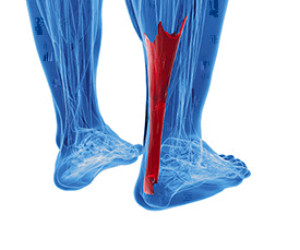

The Achilles tendon connects the calf muscles to the heel bone and plays a vital role in everyday movements. It allows you to perform actions like rising up on the toes, walking, and running. Despite its strength, the Achilles tendon is susceptible to various injuries that can be painful and debilitating. Achilles tendinopathy, also known as Achilles tendonitis, involves tiny tears in the tissue surrounding the tendon. These are often caused by overuse. Symptoms include pain, swelling, tenderness, morning stiffness, and decreased strength and movement in the affected leg. An Achilles tendon tear or rupture is a more severe injury that can result in sudden, sharp pain, swelling, bruising, and a loss of function, making it difficult to point the foot downward or stand on the toes. Some patients with partial tears may not experience noticeable symptoms. It's important to note that Achilles tendon issues often develop gradually due to cumulative damage. If you suspect you have incurred an Achilles tendon injury, it is suggested that you make an appointment with a podiatrist for the most suitable treatment approach for dealing with your injury.
Achilles tendon injuries need immediate attention to avoid future complications. If you have any concerns, contact Dr. Alan J. Spector of Shore Podiatry. Our doctor can provide the care you need to keep you pain-free and on your feet.
What Is the Achilles Tendon?
The Achilles tendon is a tendon that connects the lower leg muscles and calf to the heel of the foot. It is the strongest tendon in the human body and is essential for making movement possible. Because this tendon is such an integral part of the body, any injuries to it can create immense difficulties and should immediately be presented to a doctor.
What Are the Symptoms of an Achilles Tendon Injury?
There are various types of injuries that can affect the Achilles tendon. The two most common injuries are Achilles tendinitis and ruptures of the tendon.
Achilles Tendinitis Symptoms
Rupture Symptoms
Treatment and Prevention
Achilles tendon injuries are diagnosed by a thorough physical evaluation, which can include an MRI. Treatment involves rest, physical therapy, and in some cases, surgery. However, various preventative measures can be taken to avoid these injuries, such as:
If you have any questions please feel free to contact our office located in Point Pleasant, NJ . We offer the newest diagnostic tools and technology to treat your foot and ankle needs.